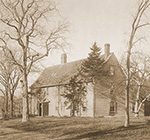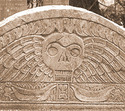Thomas Pierce of Dorchester and Wife Mary by William B. Tkask, Esq., of Boston.
In the Book of the Lockes, p. 317, it is stated that Thomas Pierce married Mary, daughter of George Proctor..., but I find no evidence, from any source, that Thomas Pierce married Mary Proctor, while there is sufficient proof, as will be shown, I think, that he wedded Mary Fry, of Weymouth. Her birth is given as having occurred, 9 (11) 1641.
Her elder sister, Elizabeth, who was united to Nathan Fiske, son of Nathan, of Watertown (see Bond's Watertown, p. 214, surname of said Elizabeth unknown to Dr. Bond), was born in Weymouth, 20 (10) 1639. In the nuncupative will of William Fry, of Weymouth (who died Oct. 26, 1642, Reg. iL 385), he gives his house and four acres of land, being his home lot, to his wife. After her decease, the same, with other lands, was to go to his two daughters, Elizabeth and Mary.
On the 15th of May, 1672, conveyance was made to Samuel White, of Weymouth (Suffolk Deeds, Lib. XX. 456), of lands in that town, from Thomas Pearce, of Dorchester, and Mary his wife, and Nathan Fiske, of Watertown, and Elizabeth his wife. The lands thus conveyed, the instrument informs us, were
recorded on Weymouth Towne book to William Fry, deceased, the reputed father of the above sd Mary and Elizabeth.
This deed to White is signed by the parties, Thomas Pearce, Mary Pearce, Nath. Fisk and Elizabeth Fisk, and was received and recorded at the Probate Office in Boston, Dec. 2, 1701.
Among the early entries of marriages, called the Suffolk County returns, to be seen at the Registrar's office in Boston, is the following: "Tho Pearse to Mary " (surname not given), "by Mr Bellingham, 3. 8. 1661." I feel confident that this is the record of the marriage of Mr. Pierce to Mary.
In the Dorchester Cemetery stands a grave-stone with the inscription (see Reg. iv. 277) "Mary Pierce | Wife to | Thomas Pierce | Aged 62 years | Died March ye 22d | 1704."...
Elizabeth and Mary Fry joined Dorchester Church in 1659, as we learn from the Church Records, volume one:
John Blackman & Sarah his wife & Elizabeth & Mary Fry being dismissed from ye Church of Waymoth viz: the two latter p'sons, they wer all admitted ye 10 (5) 59.
Two years before the marriage of Thomas Pierce to "Mary," as recorded, Elizabeth and Mary Fry joined Dorchester church. Mary was at that time in the seventeenth year of her age.
Ten months and eighteen days after the marriage of Thomas and Mary Pierce, or "Pearse," a son Thomas was born to them. He eventually married Sarah, surname not learned.



